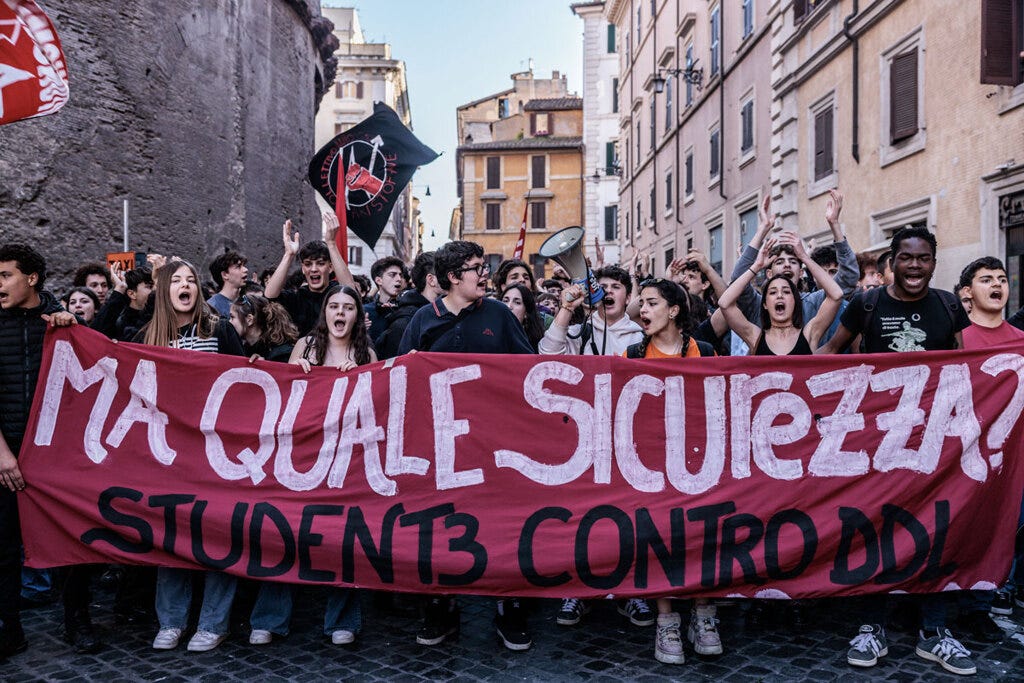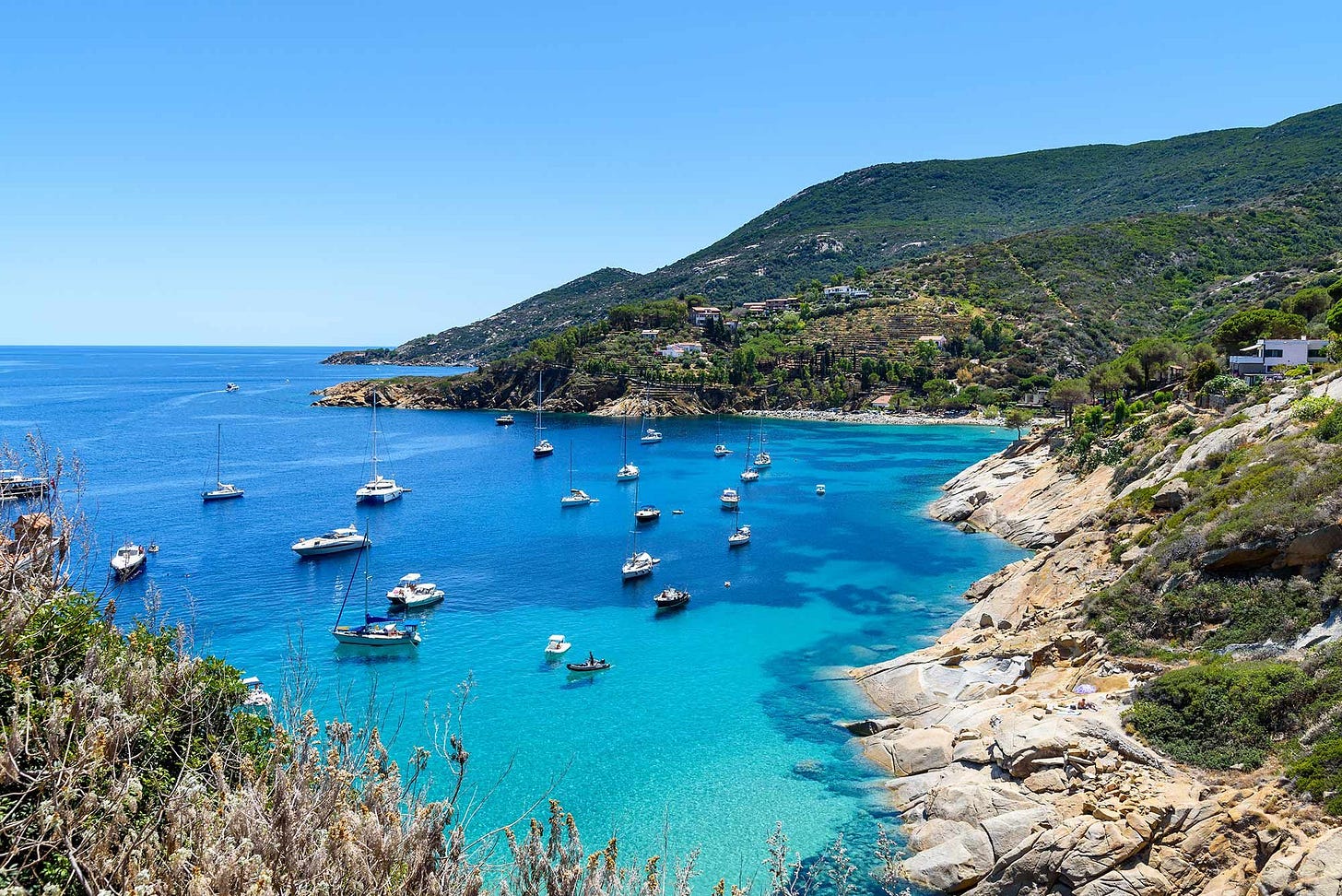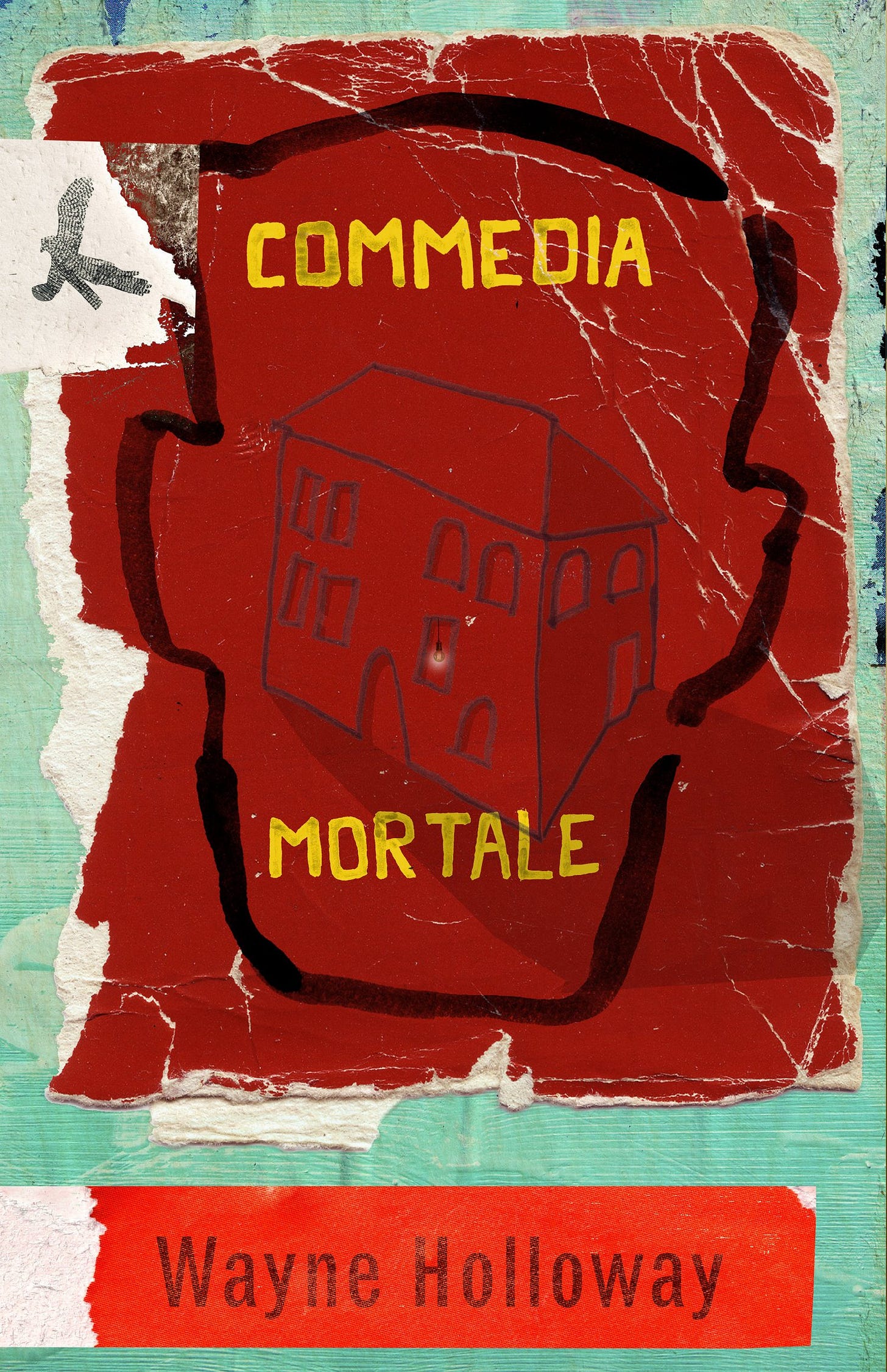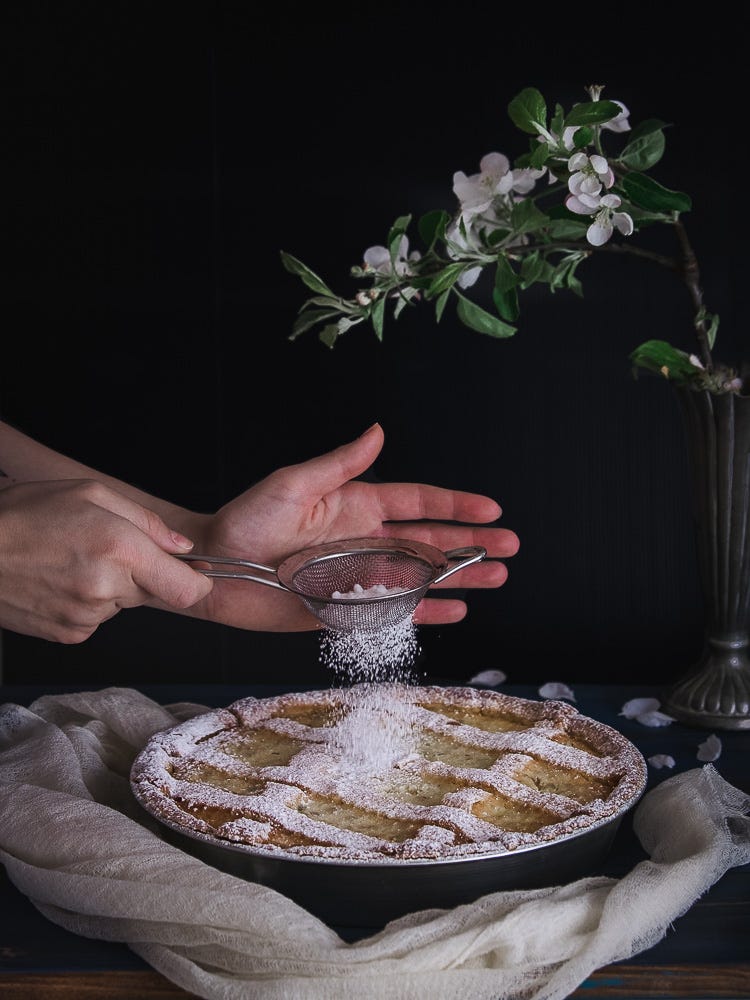An “Emergency” Decree
Plus, Tuscan seaside reveries and a new novel about Ligurian village life
With the media so preoccupied by Donald Trump right now, Georgia Meloni’s far-right administration has been taking advantage of the global chaos to accelerate its assault on civil liberties. Last week, Italy’s Council of Ministers fast-tracked the so-called Security DDL into an emergency ‘decree-law’ which, in plain English, will introduce a host of new crimes. This Bill will have serious consequences that should concern all of us, and activists in particular. Graffitiing a public building could now get you up to 1.5 years in prison. Blocking a street? That’ll be two years in prison. Occupying a building? That could cost you an astonishing seven years in prison! If this wasn’t worrying enough, the Bill also contains other insidious clauses. Cannabis light (i.e. “CBD weed”), will soon become illegal, meaning there will no longer be any distinction between mild hemp plants and THC-heavy skunk. Possession of either could cost you a fine of up to 77,000 euros and two to six years in prison. And just in case you’re still under the illusion that these proposals are reasonable enough, well, how about this one? With the passing of the new Bill, police officers will no longer be “held back” by regulations that “only” permit them to carry their designated service firearm (and “only” when they are on duty). From next month, officers will be free to carry rifles, “any pistol of their choice”, and knives with blades of up to 65 centimetres even when they are not working. The new law has nothing to say about poverty, muggings, community bolstering; nothing to say about hate crime, racism, homophobia or mafia violence. It has nothing to say, in other words, about real security concerns. It is a political bill aimed specifically at quashing the efforts of democratic campaigners. As UN officials have put it in an open letter, “the decree will put freedom of expression at risk and may disproportionately affect specific groups, including racial or ethnic minorities, migrants and refugees, potentially leading to discrimination and human rights violations.” Read their full statement here.

Later this year, on 8-9 June, Italians will be asked to vote in a referendum on workers’ rights. A vote in favour will mean new employment protections, better compensation to workers in cases of dismissal, clearer legislation regarding workplace safety and new laws to prevent companies abusing short-term contracts. A vote against would maintain the neoliberal status quo established by Matteo Renzi’s Jobs Act. Last Friday, Maurizio Landini, Secretary General of the CGIL trade union association, launched the YES campaign with a rousing speech calling for “a spring of action” where “the Italian public can finally be empowered to make a decision about their own fate and begin a fight back against Meloni.” This a fair sentiment, of course. But frankly, advocates face an uphill struggle. Government officials are already presenting the referendum as a reactive “communist” rollback; something “uncompetitive” and “unrealistic” in our “entrepreneurial times”. And while a positive verdict would potentially benefit millions of Italians, the chances of this referendum reaching quorum remain low I’m afraid. Of all the challenges facing Italy’s labour movement in the weeks ahead, this is the biggest: convincing a demotivated, cynical, non-partisan and anti-political electorate that positive change is still possible through direct democracy. Good luck to them!

‘What’s that?’ I hear you asking, ‘a travel piece about Tuscany that’s not just another listicle about Florence?’ I promise you, it’s true. This week the author and journalist Lee Marshall penned an excellent and refreshingly in-depth feature for Travel + Leisure magazine about the pleasures of the region’s Southern coastline and specifically the small villages around Giglio island and Monte Argentario in the province of Grosseto. In his piece, Marshall shares some valuable reflections on three decades of visiting this understated, wild and largely unspoilt corner of Tuscany and he also provides a sweeping overview of the recent changes, both positive and negative, that have transformed the province in recent years. I for one found his descriptions of the area’s hotels, food and beaches seductive, and I’m already fantasising about an autumn vacation to the area. So click here to read the story and to find out more about “the burgeoning southern Tuscan seaside” which, in the author’s words, is a perfect destination for “a new breed of curious visitors who have no desire to be confined to a gated resort or villa.”

Arts & Culture: A Ligurian Chorus
The author Wayne Holloway has got a new novel out next week with Influx Press which, if the first few pages are anything to go by, is going to be up many readers’ streets here. Commedia Mortale is an intergenerational fable set in an old mountain village in Liguria. The book tells the story of a mysterious farmhouse which has the power to store the memories of all those who dwell in it and “tell their stories”. From pagan rituals to the antics of modern village life, Holloway’s novel explores “the clash between outsiders and locals, the tall tales of ageing Second World War Partisans, the dreams of a chef to travel to parts unknown supported by a Greek chorus of drunks, a talking parrot, and asylum-seeking footballers with their own dreams.” There are recommendations and recommendations. But if you enjoy the themes that I tackle in this newsletter this novel truly seems an excellent fit for your reading needs. Order a copy straight from the publisher here.
The Italian alt-rock artist Niccolò Contessa released a surprise album last Friday under his alias i cani and, of course, the music press has been lapping it up. Post-Mortem is Contessa’s first record since 2016’s widely celebrated Aurora, which many critics have labelled the “best Italian indie album of the 00s.” This new record begins in a somewhat darker spirit with a fuzzy guitar riff and a gritty sample from Andrei Tarkovsky’s 1979 film "Stalker” setting the mood. Over the subsequent 13 tracks Contessa takes the listener on a journey through electronica, new wave and lo-fi soundscapes, blending grunge with post-punk and other influences. Lyrically, this is an ambitious work. The singer references Kafka, Thomas Mann and several existentialist philosophers on the record (though thankfully he also takes some time out from this somewhat po-faced performance to poke fun at the hipster indie scene of the early 2010s). The final result is moody, complex and mysterious. There’s been no lead single, no live dates and Contessa has done no interviews. In a statement announcing the release, the singer simply said: “I want the music to speak for itself.” Check out the full album here, to see what all the fuss is about.
Recipe of the Week: Pastiera Napoletana
This week’s recipe dates back centuries, and some historians maintain a version of it even existed as far back as the 5th Century BC! According to legend, the residents of Naples invented the pastiera, a precursor to the modern day cheesecake, as a means of paying tribute to the mermaid Parthenope, who they claimed had chosen the city as her home. Since then, of course, this story, and the recipe, have changed significantly, and the pastiera is now the signature dolce eaten during Easter week across the South of the country. Traditionally, chefs prepare this dish with wheat cooked in milk, “to symbolize the fusion of animal and vegetable kingdoms,” though nowadays contemporary bakers prepare variations with rice or other grains, and add extra ingredients like chocolate chips or sour cherries into the mix too. Personally, I enjoy a relatively traditional pastiera, and this recipe by Carlotta Zadra — boasting a delicate ricotta filling, lightly spiked with orange blossom — looks and sounds delicious. So if you’re still searching for an Easter weekend baking project: this one’s for you.
I’m Jamie Mackay, a UK-born, Italy-based writer, working at the interfaces of journalism, criticism, poetry, fiction, philosophy, travelogue and cultural-history. I set up ‘The Week in Italy’ to make a space to share a regular overview of the debates and dilemmas, innovations and crises that sometimes pass under the radar of our overcrowded news feeds, to explore politics, current affairs, books, arts and food. If you’re a regular reader, and you enjoy these updates, I hope you’ll consider becoming a supporter for EUR 5.00 per month. I like to think of it as a weekly catch-up chat over an espresso. Alternatively, if you’d like to send a one-off something, you can do so via PayPal using this link. Grazie!




